AI, the Death of 'Humanity,' the Birth of Opportunity

I spent almost 20 years trying to become a professor.
I never did. But I did become famous--briefly, for that proverbial fifteen minutes--for my college teaching. That viral tweet from 2023 was what launched this website, where I've been gathering and presenting my thoughts on religion, science, and technology for the better part of two years.
The irony, though, was that even when I was writing for Scientific American and being interviewed by Marketplace Tech for my "innovative teaching strategies," I had already given up on finding a permanent position. National media attention had no impact on my hireability (not that I expected it would). But beyond that, I was already disillusioned with higher education as a whole.
It was already bleak before. Virtually no one in my cohort of graduates from Duke has a professor job. Those that stick around usually do so as adjuncts, as I did. Naturally, over time, it becomes increasingly difficult to justify the long hours and low pay; it's a job that requires an indulgent and supportive spouse in order to even pay rent.
And that's all before AI.
I didn't go into it as much at the time, as I was trying to paint a more encouraging picture, but ChatGPT really ruined my last semester teaching. Having to take a quarter of my class outside, one-by-one, and confront them about cheating was an excruciating experience--especially when it was difficult to get a confession. After all, AI use is not always easy to prove. It isn't like plagiarism where you can find a paper trial and hold it under the nose of the student or the dean. Sometimes your only proof is intuition. I'm certain more of them cheated than those who confessed.
I mention all this because, this week, New York Magazine published an article entitled "Everyone Is Cheating Their Way Through College: ChatGPT has unraveled the entire academic project."
It's behind a paywall, but I recommend you read it if you can. It is exceedingly, intolerably, soul-crushingly grim.
The Great Unraveling

"Who should bear the costs?" asks cognitive scientist and AI critic Gary Marcus in his recent Substack post (which actually mentioned my classroom experiment).
It's a good question. Because so far, it seems the answer is that the professors and instructors and adjuncts and high school teachers are the ones who are bearing the burden. And they're not doing well, because it's an impossible task.
Just look at some of the examples (quotes borrowed from others, like Gary Marcus and Erik Hoel):
After spending the better part of the past two years grading AI-generated papers, Troy Jollimore, a poet, philosopher, and Cal State Chico ethics professor, has concerns. “Massive numbers of students are going to emerge from university with degrees, and into the workforce, who are essentially illiterate,” he said.
Or this:
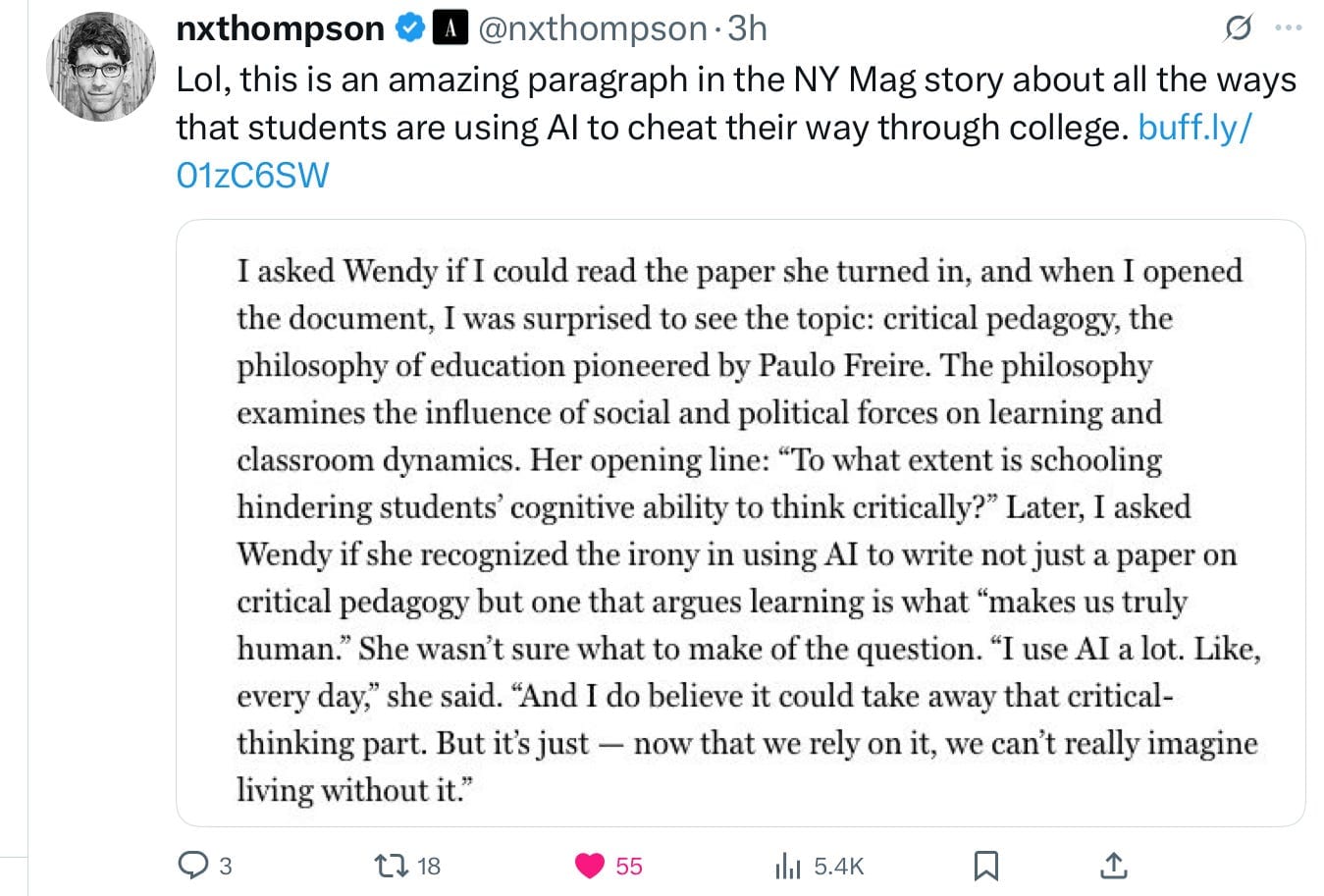
This accords with my experience.
Towards the end of my time at Elon, I bumped into a former student in the parking lot and asked him about AI use. I wanted to know, "Is it as bad as it looks?"
He nodded and made a wry grimace. "Everyone's using it," he said. "Math, history, science. Whatever."
A number of teachers have simply given up. Consider this piece from Time late last year: "I Quit Teaching Because of ChatGPT."
As the author, Victoria Livingstone, pointed out, the problem is that writing an essay is not simply about producing the output. The act of writing is closely related to the act of thinking, and if you don't learn how to do one then you are not going to do well at the other.
In my class, I told my students that using ChatGPT to write their essays would be like paying someone to go to the gym for you. The work gets done but you get zero benefit. In fact, it actually will hurt you in the long run. Many of my students agreed. Two of them even shared their opinions about it the Scientific American article.
Gary Marcus, in his comment on my assignment, wrote that:
As a one-off it’s a great assignment.
But here’s the thing. We are going to do need a more thorough going redesign than that. And, crucially, there is a problem of scale. Term papers exist in part because they are an economically efficient way of teaching and evaluation large numbers of students. Or at least they were. Now they are basically worthless.
I concur. But what do we do?
Erik Hoel contended that old-fashioned essay writing is simply not possible anymore.
Tracking the impact of education by grading outputs is no longer a thing, ever again. It was a good 3,000 year run. We had fun. It’s over. Stop grading essays, and start grading the creation of the essay. Same goes for everything else.
Instead, he suggests, teachers can grade students' workflows. Not just their outputs. The finished product isn't the whole point (after all, don't we judge math homework not just on the right answer but on the whole process of arriving at the right answer?). Can we do the same with writing? Maybe we can have students write their essays on shared Google docs. The professor can check their edit history to see not only what they're doing but when and how they did it. In addition to putting the fear of God in them, it would make it immediately obvious if they Ctrl+V an essay from ChatGPT.
However, Hoel admits, this is extraordinarily time consuming. Maybe it'll work with a half dozen students, but more than that? I had 63 my last semester. I would not be able to do this even if I wanted to.
What is the Academic Project?

The New York Magazine piece refers to AI undoing the whole "academic project." But what is that project?
One cheating student had a very clear idea. Read this and weep:
“Most assignments in college are not relevant,” he told me. “They’re hackable by AI, and I just had no interest in doing them.” While other new students fretted over the university’s rigorous core curriculum, described by the school as “intellectually expansive” and “personally transformative,” Lee used AI to breeze through with minimal effort. When I asked him why he had gone through so much trouble to get to an Ivy League university only to off-load all of the learning to a robot, he said, “It’s the best place to meet your co-founder and your wife.”
It is the logical culmination of a century's remaking of education into an outsourced training process with one goal: to "get a job."
We can't even applaud this particular tech-bro for being the first person to overcome brain-death and earn a degree. There are thousands, probably millions, more proud degree-owners suffering from the same affliction he is. They, and he, are under the impression the only reason college exists is to find a partner for your startup and maybe find a wife with whom you can form a Limited Liability Marriage.
The point of humanities education is not this. It can, of course, help you get a job, because (stereotypes notwithstanding) it does train you to think and it provides an exceptional number of both hard and soft skills that are beneficial. But it does more than that. It trains you to be a human. It's no longer obvious to our benighted culture, but that's what humanities means--to cultivate your humanity.
But humanity is not valuable in 21st century education, 21st century economics, and 21st century America. It's too inefficient. Too wasteful. Too unproductive.
Someone asked on Gary Marcus's substack, What do we do? How do we fight back against this? Where do we even begin?
To be honest, I'm not very optimistic. I wrote there, and will repeat here, that individual bits of heroic resistance simply aren't enough. In order to triumph against the megamachine we would have to reorient our entire culture away from its death drive and towards one that has human flourishing and well-being as its primary goal. And that is a tall order.
Human Religion in a Machine Age

However, something else interesting happened last week.
I'm not Catholic, but like almost everyone else I was very curious who would become the next pope. I was initially surprised to hear an American, Robert Prevost, had been elected. I had never heard of him. But the more I learned about him, the more it appears to make sense.
The reason behind his name, Leo XIV, is significant.
The last Leo, XIII, was the author of Rerum Novarum, one of the most important encyclicals in the modern history of Catholicism. The letter, sent out in 1891, was concerned primarily with the widespread abuse and oppression of workers laboring under the boot of gilded-age capitalism and the industrial revolution. On capitalism, Leo XIII wrote:
A small number of very rich men have been able to lay upon the teeming masses of the laboring poor a yoke little better than that of slavery itself.
Sounds familiar.
What must we do?
If we turn not to things external and material, the first thing of all to secure is to save unfortunate working people from the cruelty of men of greed, who use human beings as mere instruments for money-making. It is neither just nor human so to grind men down with excessive labor as to stupefy their minds and wear out their bodies.
We have to dislodge this conception of humanity as an instrument, this pernicious but ever-present belief that our only value consists in our ability to generate capital.
Rerum Novarum was not socialist either, despite that shrieking sound you hear emanating from talk radio. Instead, it is the foundation for what is now called Catholic Social Teaching.
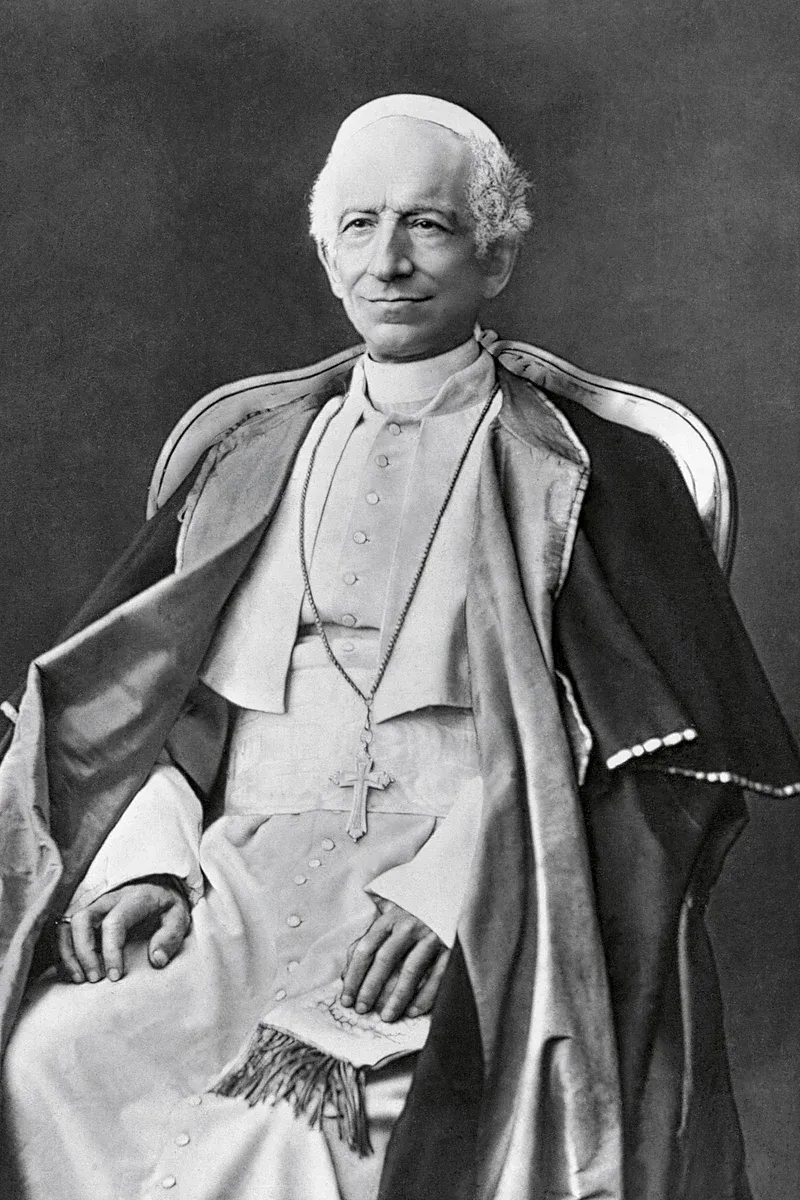
The Vatican has explicitly stated that Leo XIV chose his name in reference to Leo XIII and that one of his primary concerns is the rise of AI and the exploitation that is being visited upon workers and humans as a whole.
As Leo XIV himself said:
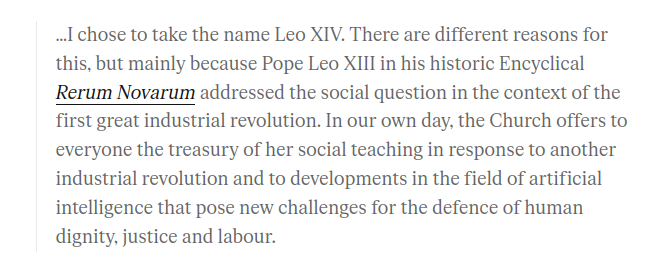
This is a continuation of Pope Francis's concerns, for toward the end of his life he became (as PBS recounts):
increasingly vocal about the threats to humanity posed by AI and called for an international treaty to regulate it. He warned that such powerful technology risks turning human relations into mere algorithms.
I'm not sure how much optimism I have about this. But maybe there is an opportunity here. Maybe there is potential for an alliance between religious people of all kinds (not just Christian) along with their pro-human secular compatriots.
"What is man, that thou art mindful of him?" asks the Psalmist. Beneath the angels, we are nevertheless "crowned...with glory and honor." Humans matter. Humans are worth saving. Humanity is worth dying (and resurrecting) for.
But to the machine god, the answer to the question "what is man?" is--Nothing.
The Church: A Place for People?

Earlier this month, we held our twice-annual Greek Festival in Durham.
It's always an interesting experience. I'm now the one who gives the "tours" (which have gotten so big they're mostly just lectures now), explaining the history of the Orthodox Church and discussing the icons.
Many people ask many questions, and last Sunday I was on my feet for five straight hours talking with visitors. After one of the lectures, a recent Orthodox convert and two of his friends (who were both agnostic/atheist) came up to chat. We talked for a long time about many different things, but one angle that came up was the "humanity" of the church.
I pointed out that, with the decline of the "third space" in American life, there are very few places left where people can go to simply be. We have work and we have home. And, often, that's it. No social space to speak of. "This dearth of once-common shared spaces is increasing loneliness, especially among youth."
However, one type of third space that still exists is the religious one. IE, a church (or temple, synagogue, mosque, etc.).
And, to push it further, most of our home and work spaces do not really feel like they were designed "for" us. We feel colonized by work wherever we go, by omnipresent screens through which we not only toil but also interact with the world.
"The church might be one of the last places that is still for people," I mentioned to my interlocutors at the festival. "It's one of the only spaces that you can just be a human being."
"Yeah," said one of the friendly agnostics, "that's a fair point."
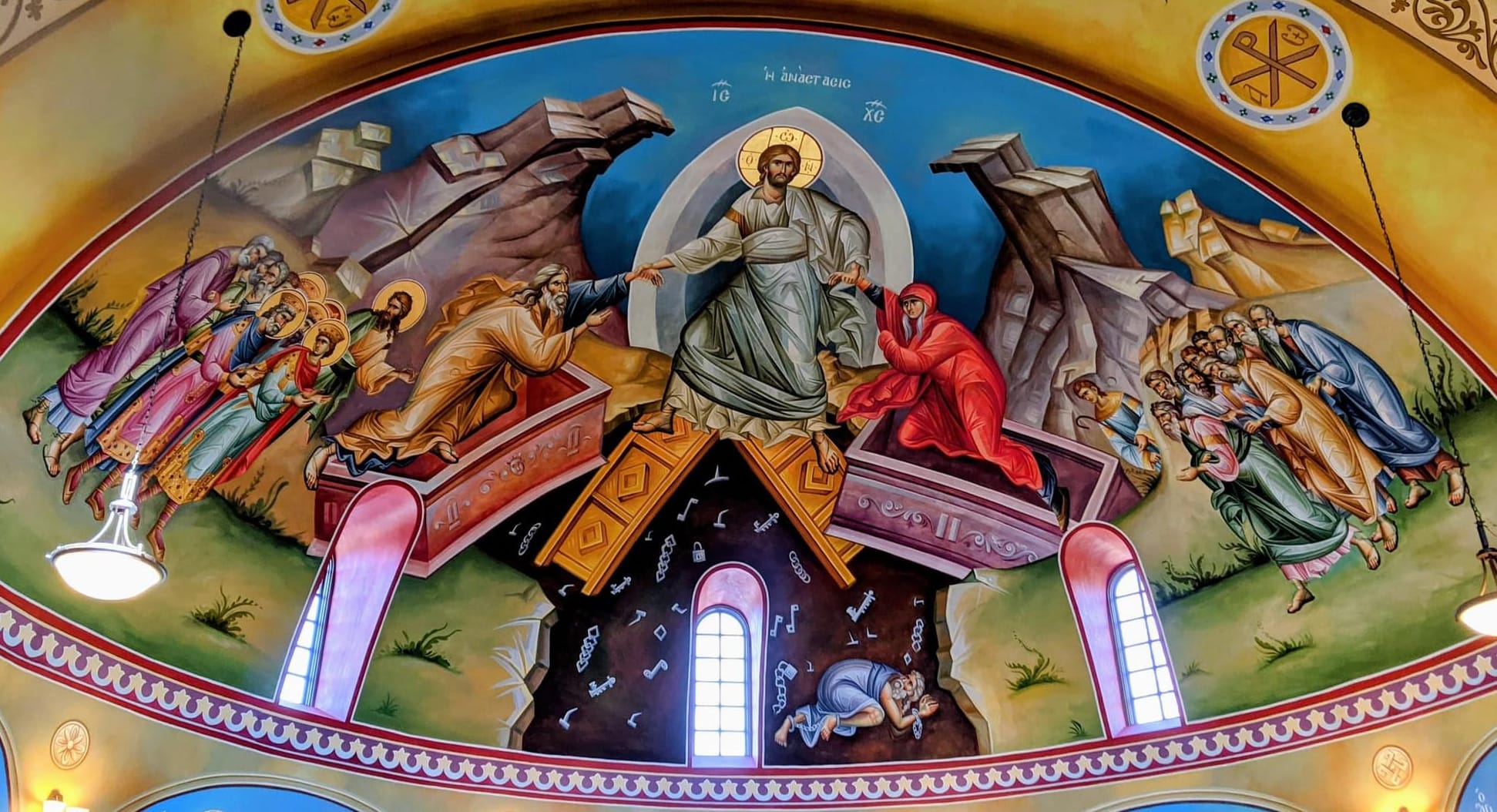
It's evident in the new iconography that now adorns our parish.
The resurrection icon portrays Jesus emerging from the tomb on Easter, and in Orthodox Churches it also depicts him rising up from hell (after the descent) and rescuing those who have died. Here, you can see him pulling Adam and Eve out of the pit, while Hades/Hell/Death languishes at the bottom in chains, his power broken.
Adam, of course, is a given name, but it also simply means "human" or "humankind."
I like to think of the resurrection icon as depicting the rescue not just of Adam himself but of all humanity, in one dramatic act of defiance against the forces of death.
Such an image highlights that, despite all our problems and our weaknesses and our failures, people matter.
In a world that is increasingly falling under the sway of anti-human forces like the techno-feudalists in Silicon Valley and the oligarchic cronyism in Washington DC, it may be that our religious institutions are where the human resistance might find a bedrock from which to build. This will require, naturally, shelving all the petty disagreements between different versions of Christianity, and also making common cause with other religions, along with secular humanists who are just as deeply distressed by the obliteration of humankind.
It might be too much to ask (especially given the Christian track-record on this topic is hardly encouraging; after all, many churches are slavishly devoted to Mammon and are willing political bootlickers), but if something is to be done, I am not sure where else it can get started.
Our governments, our education systems, our corporations and business--none of them truly think humanity is valuable. It was our productivity that mattered most in these settings, and now AI is proving possibly more productive. In some ways, AI might offer us a gift, for it's now pulling the veil back on just how inhuman our entire way of life has been.

Looking to the past can be illuminating.
Many Christians have bemoaned the decline of the church in the modern era and especially in 21st century America (even when Christianity in the USA can only blame itself for much of this). But how interesting it would be if, on the verge of plunging into a true Dark Age (where our politicians are practically and functionally illiterate, and the sole vestiges of humanistic learning persist only in religious institutions like monasteries, seminaries, and colleges), the Church found itself a bulwark again.
In the collapse of the Roman Empire, Christianity emerged triumphant because it had more to offer the weak and downtrodden of the world than the competing philosophies did. "Pagan religion and philosophy offered no such hope," writes John Gray (no apologist for Christianity), "Wisdom lay in accepting the world." Grit your teeth and bear it. It's the reason Stoicism was popular then, and it's likely the reason it's popular again today.
But in a chaotic time, the Church grew, according to the legendary classicist E.R. Dodds, because of its totalizing creed, its openness to all regardless of their social status, its appeal to the poor and disinherited, and finally, "The Church provided the essentials of social security: it cared for widows and orphans, the old, the unemployed, and the disabled; it provided a burial fund for the poor and a nursing service in time of plague."
These are all things we have contended with (and are contending with) in the 21st century. Perhaps, if the Church might find within itself the will to contend with these problems again, and to contend for humanity, it might find itself once more appealing to the disinherited.
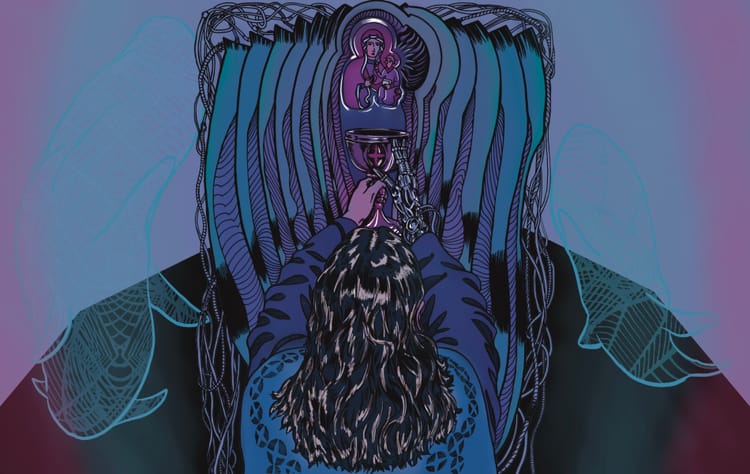



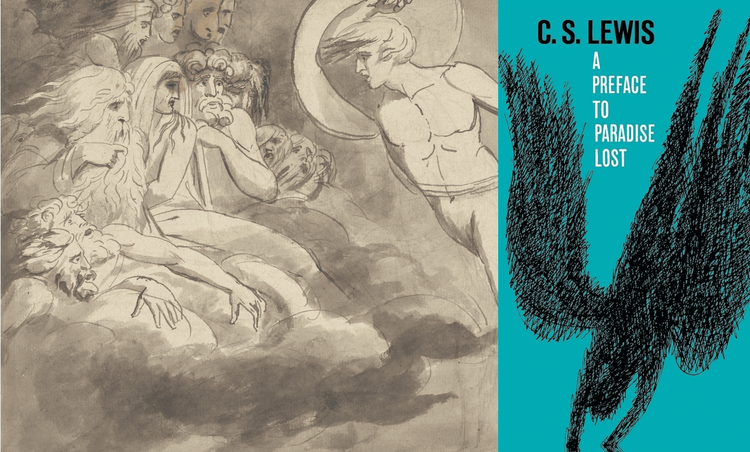
Member discussion